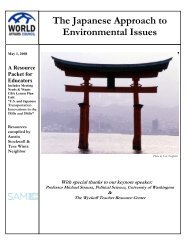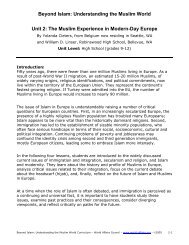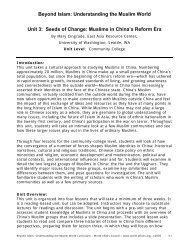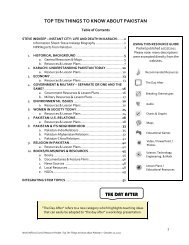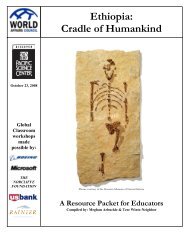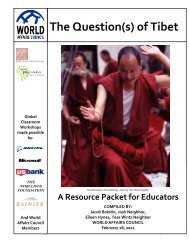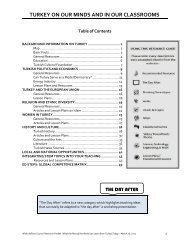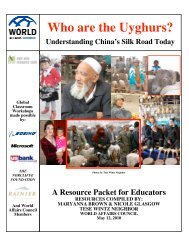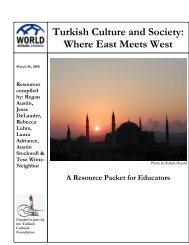If King Tut Could Talk - World Affairs Council
If King Tut Could Talk - World Affairs Council
If King Tut Could Talk - World Affairs Council
- No tags were found...
Create successful ePaper yourself
Turn your PDF publications into a flip-book with our unique Google optimized e-Paper software.
MuseologySUITABLE FOR GRADES 6-12 AND UPNYT Learning Network: You Don’t Know What You’ve Got Until It’s Found (11/2005)http://learning.blogs.nytimes.com/2005/11/02/you-dont-know-what-youve-got-until-its-found/Students consider what can be learned through the study of artifacts, focusing on those of ancient Egypt.They then research famous ancient Egyptian sites to prepare for the development of proposals forexhibits in a fictional children’s wing at the Egyptian Museum. (See p. 6 of this packet for moreinformation.)NYT Learning Network: Electric Exhibitions (07/2001)http://learning.blogs.nytimes.com/2001/07/20/electric-exhibitions/In this lesson, students will learn about how modern technology can beused to enhance existing museum exhibits.Modify this lesson after visitingthe <strong>King</strong> <strong>Tut</strong> Exhibit orexploring the exhibit online(see p. 2 for resources).History, Artifacts, and Museums (2009)http://www.teachingushistory.org/lessons/HistoryArtifactsMuseums.htmDepending on the artifacts used to teach this lesson, the content standards will vary, but it can be appliedto any time period. Students will interpret calendars, time lines, maps, and other artifacts. These lessonsare designed for 11 th grade history students and require two 90 minute classes to complete.M.A.T.R.I.X.: Museum Methods (2003)http://www.indiana.edu/~arch/saa/matrix/mm/mm_06.htmSite links to eight lessons with accompanying classroom exercises, assignments, handouts and additionalsources about Museum Methods. A unit syllabus is also included.UCL: Museum Studies and Object Based Learninghttp://www.ucl.ac.uk/museums/learning/object-based-learningMuseums are not static institutions. There is a constant need to rethink and redefine what a museum isor can be. UCL Museums and collections offers a wide range of high quality museum collections, digitalresources, and innovative ideas for teaching. (Geared toward university students and professors).SUITABLE FOR ALL GRADESBritish Museum: Ancient Egypthttp://www.ancientegypt.co.uk/menu.htmlExplore the British Museum’s collection of ancient relics online. Many exciting resources are available onthe main site as well.A History of the <strong>World</strong> in 100 Objects (10/2011)http://www.britishmuseum.org/explore/a_history_of_the_world.aspxNYT Learning Network Lesson plan:http://learning.blogs.nytimes.com/2011/10/31/whether-humble-or-glorioustelling-stories-of-human-history-through-objects/Discover the 100 objects featured in the Radio 4 series; listen to the programsUse these Egyptianobjects as inspiration forcreative, descriptive, orexpository writingexercises.online and download the podcast; see what other museums have contributed, and find out more aboutthe project. Objects 1, 20, 22, and 33 are directly related to ancient Egypt.The Supreme <strong>Council</strong> of Antiquitieshttp://www.sca-egypt.org/eng/main.htmThe principal mission of the Ministry of State for Antiquities, previously known as the Supreme <strong>Council</strong> ofAntiquities, is to protect and promote the cultural heritage of Egypt, both independently and incooperation with national and international organizations.<strong>World</strong> <strong>Affairs</strong> <strong>Council</strong> Resource Packet: Pacific Science Center Presents—The Golden <strong>King</strong> and the Great Pharaoh: November 1, 20125



